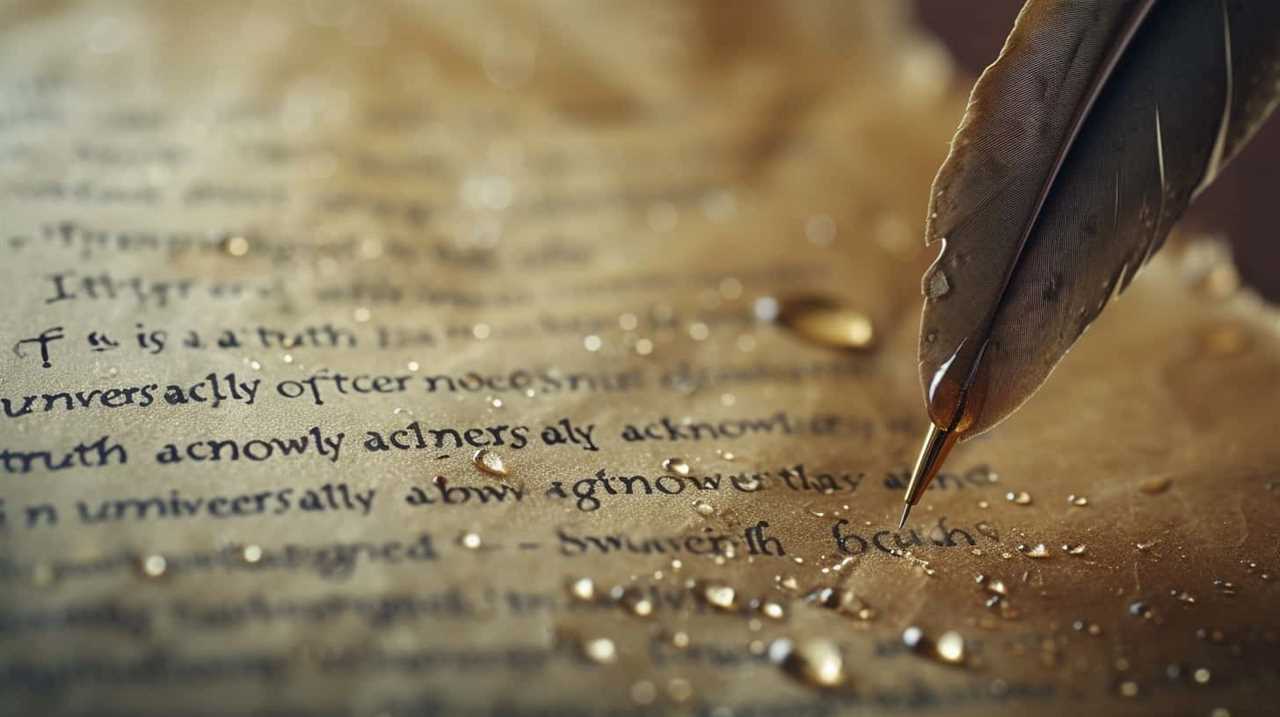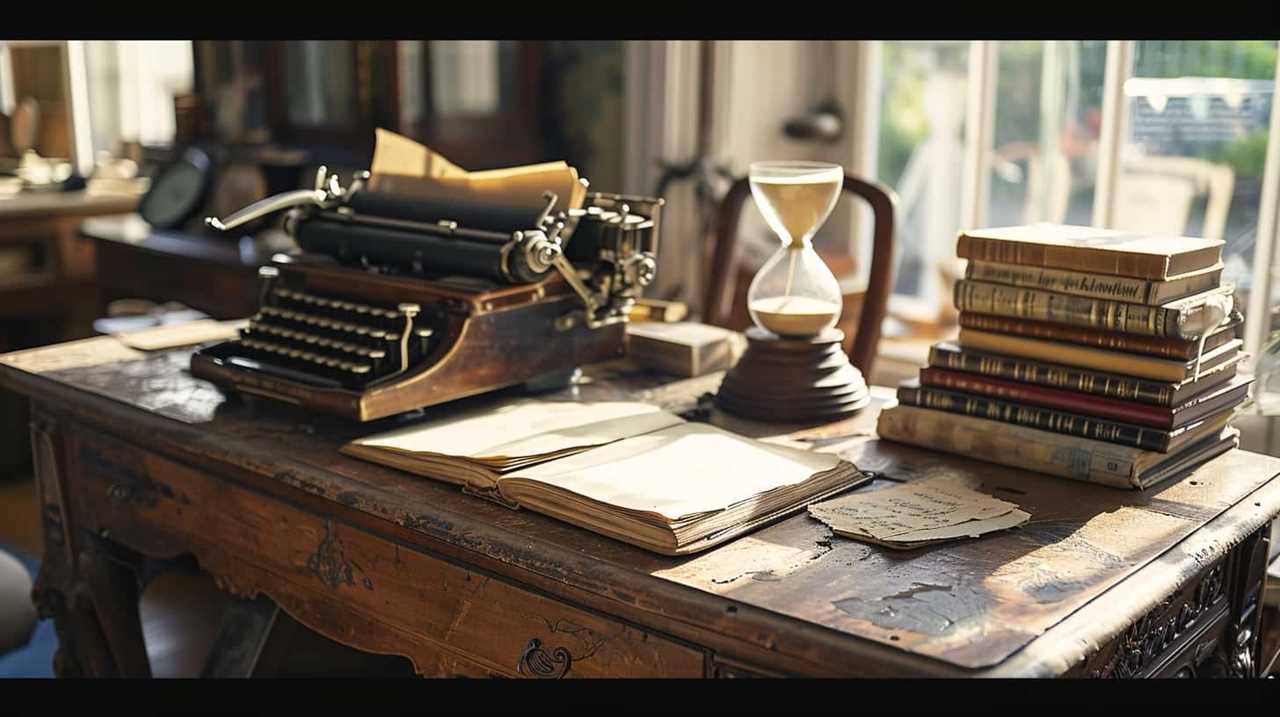Have you ever thought about what sets apart the opening sentences of books? Let me break it down for you. Those first lines act as a breath of fresh air in a stale room. They spark your imagination, captivate you right from the beginning, and leave you hungry for more.
They are the key that unlocks the doors to incredible worlds and unforgettable characters. From the iconic ‘Call me Ishmael’ to the intriguing ‘It was the day my grandmother exploded,’ these nine opening sentences are a testament to the power of words and the art of storytelling.
So, get ready to embark on a journey of literary innovation as we delve into the 9 best memorable opening sentences in literature.
Key Takeaways
- Memorable opening lines in literature have a significant impact on readers and can establish a personal connection and set the stage for deeper exploration of symbolism.
- Charles Dickens’ opening line "It Was the Best of Times" is enduringly powerful and influential, referenced, parodied, and adapted countless times in various forms of media.
- The line captivates readers with contrasting imagery and creates an atmosphere of anticipation and excitement, leaving a lasting impression.
- The metaphor of a "hole in the ground" as a symbol represents the unknown and unexplored territories of the mind and the world, inviting readers to venture into the depths of imagination and seek transformative experiences in literature.
Call Me Ishmael
Call Me Ishmael is one of the most iconic opening lines in literature. It immediately grabs the reader’s attention and invites them to delve into the story. The personal connection established through the use of the first-person perspective creates an immediate bond between the reader and the narrator. By addressing the reader directly, the author compels us to become a part of the narrative, making us feel like an active participant rather than a passive observer.

This opening line also sets the stage for a deeper exploration of symbolism. Ishmael, the narrator, isn’t just a name; it carries deep meaning and significance. In the Bible, Ishmael is the outcast son of Abraham, representing a sense of isolation and longing for acceptance. Through this name, the author foreshadows the themes of loneliness and the search for identity that pervade the novel.
The symbolism analysis in ‘Call Me Ishmael’ showcases the author’s innovative approach to storytelling. It challenges traditional narrative conventions and presents a unique perspective that resonates with readers seeking new and thought-provoking experiences in literature.
Transitioning into the subsequent section about ‘it was the best of times,’ we can see how these memorable opening lines captivate readers in different ways, inviting them to explore both the personal and universal aspects of the human experience.
It Was the Best of Times
As you delve into the analysis of literary openings, one can’t help but acknowledge the impact of those famous intros that have stood the test of time. ‘It was the best of times, it was the worst of times,’ the opening line of Charles Dickens’ ‘A Tale of Two Cities,’ immediately captivates readers with its contrasting imagery and sets the stage for a story of both joy and despair.

Literary Openings Analyzed
First, let’s analyze the opening sentence of ‘It Was the Best of Times’ from a literary perspective. This iconic line from Charles Dickens’ novel A Tale of Two Cities is not only memorable but also rich in hidden symbolism and indicative of the novel’s narrative structure. The sentence sets the tone for the entire story by juxtaposing contrasting ideas of "best" and "worst" times. It represents the duality and turmoil of the historical period in which the novel is set—the French Revolution. The use of the past tense, "It was," suggests that the events about to unfold have already passed, giving readers a sense of anticipation and curiosity. The sentence also introduces the theme of sacrifice, as the novel explores the sacrifices made for love, family, and revolution.
| Hidden Symbolism | Narrative Structure |
|---|---|
| Duality | Juxtaposition |
| Turmoil | Anticipation |
| Sacrifice | Curiosity |
Impact of Famous Intros
Exploring the impact of famous intros, you’ll discover the enduring power and influence of Charles Dickens’ opening sentence in ‘It Was the Best of Times’.
This iconic line hasn’t only stood the test of time but has also ingrained itself in popular culture. Its cultural significance is undeniable, as it has been referenced, parodied, and adapted countless times in literature, film, and other forms of media.
The reader engagement that this sentence elicits is remarkable. It immediately captures the attention and curiosity of the reader, drawing them into the story with its dramatic and evocative language.

By setting the stage for a tale of contrasts and extremes, Dickens creates an atmosphere of anticipation and excitement.
As we delve deeper into the memorable lines dissected, we’ll see how these opening sentences shape our reading experience and leave a lasting impression.
Memorable Lines Dissected
To fully appreciate the impact of Charles Dickens’ opening sentence in ‘It Was the Best of Times’, let’s delve into the memorable lines dissected and see how they shape your reading experience.
- The sentence begins with a juxtaposition of extremes, immediately capturing your attention and creating a sense of anticipation.
- It sets the tone for the entire novel, hinting at the contrasting themes of good and evil, light and darkness.
- The use of repetition emphasizes the idea of duality and introduces a rhythmic quality to the writing.
- By starting with a general statement, Dickens invites you to explore the hidden narratives within the story, encouraging a deeper engagement with the text.
Dickens’ opening sentence not only grabs your attention but also establishes the literary impact of his work. It sets the stage for a complex exploration of human nature and societal issues, inviting you to uncover the hidden narratives that lie beneath the surface.

As you read further, you’ll discover the depth and richness of Dickens’ storytelling, making ‘It Was the Best of Times’ a truly unforgettable reading experience.
In a Hole in the Ground
You’ll find yourself in a hole in the ground, completely enveloped in darkness. It’s a disorienting experience, one that immediately captures your attention and sparks your curiosity. The hidden depths of this hole hold the promise of an unexpected discovery, urging you to explore further. As you inch forward, the darkness seems to press against your skin, the silence amplifying the sound of your own heartbeat. Your senses sharpen, attuned to every subtle shift in the environment. It’s in this moment, shrouded in uncertainty, that the possibilities become endless.
In literature, the metaphor of a hole in the ground serves as a powerful symbol. It represents the unknown, the unexplored territories of the mind and the world. It invites us to venture into the depths of our imagination, to seek out new ideas and perspectives. Just as Alice fell into a rabbit hole and embarked on a whimsical journey, we too are invited to plunge into the depths of literature and emerge transformed.
The opening sentence, ‘In a hole in the ground,’ serves as a gateway into a world of infinite possibilities. It sets the stage for an exploration of hidden depths and unexpected discoveries, captivating the reader’s imagination from the very first words. It challenges us to step out of our comfort zones and embrace the unknown, encouraging innovation and pushing the boundaries of what we think is possible.

All Happy Families Are Alike
What makes all happy families alike? When exploring family dynamics, it becomes evident that certain universal truths have a profound impact. These truths shape the dynamics of happy families and contribute to their similarities. Here are four key factors that create a sense of unity and contentment within these families:
- Open Communication: Happy families prioritize open and honest communication. They foster an environment where every member feels comfortable expressing their thoughts, concerns, and emotions. This allows for healthy discussions and the resolution of conflicts in a constructive manner.
- Supportive Relationships: In happy families, there’s a strong foundation of love, respect, and support. Each member feels valued and appreciated, knowing that they can rely on their family for encouragement and assistance during both good times and bad.
- Shared Values and Goals: A common thread among happy families is a shared set of values and goals. These families establish a collective purpose that guides their actions and decisions. This shared vision strengthens the bond between family members and provides a sense of direction.
- Quality Time Together: Happy families recognize the importance of spending quality time together. They prioritize family activities and create opportunities for shared experiences. Whether it’s engaging in hobbies, enjoying meals together, or embarking on adventures, these moments of togetherness foster connection and create lasting memories.
It Was a Bright Cold Day
On a bright cold day, you’ll find yourself immersed in a world filled with vivid descriptions and chilling atmospheres. The opening line of George Orwell’s ‘1984’ sets the stage for the dystopian society that lies within the pages of the novel. The choice of words, ‘bright’ and ‘cold,’ immediately creates a sense of contradiction and unease, mirroring the conflicting emotions and oppressive nature of the story. The juxtaposition of these words highlights the stark contrast between the exterior world and the inner struggles of the characters.
Symbolism plays a crucial role in this opening sentence. The brightness represents the facade of a seemingly perfect society, while the coldness alludes to the lack of warmth, humanity, and individuality within it. This contrast sets the tone for the analysis of power, control, and the manipulation of truth that permeates the novel.
As you delve deeper into the story, you’ll uncover the layers of symbolism woven throughout the narrative. Orwell’s masterful use of language invites you to question the nature of reality and the dangers of unchecked authority. The opening sentence serves as a gateway into a thought-provoking exploration of societal oppression and the power of the human spirit.

Transitioning into the subsequent section about ‘it is a truth universally acknowledged,’ we shift from a chilling dystopian world to the realm of Jane Austen’s ‘Pride and Prejudice.’ While the settings and themes may differ, both opening lines captivate readers with their ability to evoke curiosity and spark introspection.
It Is a Truth Universally Acknowledged
In literature, one of the most well-known and beloved opening sentences can be found in Jane Austen’s ‘Pride and Prejudice’: ‘It is a truth universally acknowledged.’ This iconic phrase immediately captures the reader’s attention and sets the stage for a story that explores the complexities of love, social class, and personal connections.
- Universal Truth: The use of the word ‘universally’ suggests that the truth being referred to isn’t limited to a specific time or place. It implies that the sentiment expressed in the sentence is something that resonates with people across different cultures and generations.
- Acknowledgment: The word ‘acknowledged’ implies that this truth is widely recognized and accepted by society. It suggests a shared understanding, a cultural consensus that exists among individuals.
- Personal Connections: By using the word ‘truth,’ Austen invites readers to reflect on their own experiences and beliefs. It prompts them to consider how this universal truth relates to their own lives and relationships.
- Cultural Significance: This opening sentence has become deeply ingrained in popular culture, often referenced and parodied. It has transcended the boundaries of literature and has become a symbol of Austen’s wit and social commentary.
It Was a Pleasure to Burn
Continuing from the previous subtopic, let’s delve into ‘It Was a Pleasure to Burn’ and explore its impact on readers.
The opening sentence of Ray Bradbury’s Fahrenheit 451 immediately captivates with its provocative imagery and sets the tone for the rest of the novel. The symbolism of fire in this sentence is multifaceted, representing both destruction and transformation.

Fire, traditionally associated with destruction, is used to convey the oppressive nature of the society depicted in the novel. It represents the eradication of knowledge, ideas, and individuality. However, fire also symbolizes transformation and rebirth. It’s through the burning of books that the protagonist, Guy Montag, embarks on a journey of self-discovery and rebellion against the oppressive regime.
The role of pleasure in burning is equally significant. The phrase ‘It was a pleasure’ suggests that burning books isn’t merely a duty or a job, but a source of enjoyment for the characters in the novel. This reveals the twisted nature of the society, where pleasure is derived from the suppression of knowledge and the control of information. The juxtaposition of pleasure and destruction highlights the perverse values of the dystopian world Bradbury presents.
You Don’t Know About Me
You may think you know someone, but hidden beneath their exterior lies a personal narrative waiting to be uncovered.
The power of ‘You Don’t Know About Me’ lies in its ability to challenge our assumptions and reveal the unknown identities of the characters within literature.

Through this intriguing opening sentence, authors have the opportunity to captivate readers with mysterious revelations that keep us engaged from the very beginning.
Hidden Personal Narratives
Your journey into the depths of hidden personal narratives begins with a surprising revelation. As you delve into the pages of literature, you realize that there’s often more than meets the eye. Opening sentences hold hidden meanings and personal connections that captivate our minds and hearts.
Allow me to guide you through this exploration of hidden personal narratives with the following imagery:
- Like a secret door in an old mansion, these opening sentences invite you to enter a world of untold stories.
- They’re like puzzle pieces, scattered across the literary landscape, waiting to be pieced together to reveal the bigger picture.
- Hidden personal narratives are like whispers in the wind, only audible to those who are willing to listen closely.
- They’re like hidden treasures buried beneath the surface, waiting to be unearthed by the discerning reader.
Uncovering these hidden personal narratives is an exhilarating journey that promises to challenge your perceptions and ignite your imagination. Get ready to embark on a literary adventure like no other.

Unveiling Unknown Identities
As you explore the depths of hidden personal narratives, a revelation awaits – the unveiling of unknown identities that have remained shrouded in secrecy, waiting to be discovered. In the realm of literature, unmasking secrets and unexpected revelations about characters’ true identities have captivated readers for centuries.
These literary masterpieces not only entertain but also push the boundaries of our imagination and challenge the status quo. From the iconic opening sentence of Robert Louis Stevenson’s ‘The Strange Case of Dr. Jekyll and Mr. Hyde’ to the enigmatic beginning of Daphne du Maurier’s ‘Rebecca,’ authors have expertly crafted narratives that gradually expose the hidden facets of their characters.
The thrill of uncovering these unknown identities lies in the unpredictability and the profound impact they’ve on the story, leaving readers with a sense of wonder and awe. These narratives inspire us to reflect on our own hidden identities and remind us that there’s always more to people than meets the eye.
Mysterious Literary Revelations
Unravel the hidden secrets of literature’s most enigmatic characters with unexpected revelations that will leave you astounded. These enigmatic introductions lure you into the depths of their mysterious worlds, making you question everything you think you know. As you delve into these literary masterpieces, prepare to have your perception shattered and your imagination ignited.

Here are four hidden secrets that will captivate your mind:
- A seemingly ordinary man, but harboring a dark past that will unravel the very fabric of his existence.
- A woman with a haunting past, whose enigmatic presence conceals a web of deceit and betrayal.
- A protagonist with a hidden identity, whose true nature will send shockwaves through the narrative.
- A character whose enigmatic introduction hints at a secret so profound, it will redefine the boundaries of reality.
Unleash your curiosity and embrace the unknown as we explore these hidden secrets, for it was the day my grandmother exploded that set in motion a journey of unrivaled revelation.
It Was the Day My Grandmother Exploded
When you hear the phrase ‘It was the day my grandmother exploded,’ your curiosity is immediately piqued, wondering how such a bizarre event could have occurred. This opening sentence, taken from the novel ‘The Crow Road’ by Iain Banks, sets the stage for a story that delves into hidden family secrets and an explosive family history.
In literature, opening sentences have the power to captivate readers and ignite their imagination. They invite us to embark on a journey, promising an experience unlike any other. The phrase ‘It was the day my grandmother exploded’ not only grabs our attention but also hints at a world where the ordinary is shattered, where the past unravels, and where the truth is revealed.

As we delve deeper into the narrative, we’re compelled to unravel the mystery behind this explosive event. What led to the detonation of a beloved family member? What secrets lay hidden beneath the surface of this seemingly ordinary family? Banks invites us to explore the complexities of family dynamics, the weight of untold stories, and the consequences of keeping those secrets buried.
The use of the word ‘exploded’ is particularly evocative, conjuring images of chaos, destruction, and the unexpected. It challenges our preconceived notions of what’s possible, forcing us to question the boundaries of reality and fiction. Banks’s choice of this shocking event as an opening sentence sets the tone for a story that promises to push the boundaries of traditional storytelling and challenge our expectations.
Innovation in literature lies not only in the exploration of new themes and ideas but also in the way we approach storytelling. By crafting an opening sentence that defies convention, Banks immediately grabs our attention and invites us to join him on a journey of discovery and self-reflection. As readers, we crave the unexpected, the thought-provoking, and the innovative. ‘It was the day my grandmother exploded’ offers all of that and more, promising a narrative that will challenge our assumptions, ignite our imagination, and leave us questioning the explosive nature of our own family histories.
Frequently Asked Questions
What Is the Meaning Behind the Phrase "Call Me Ishmael"?
The phrase "call me Ishmael" holds a deeper meaning than just a simple introduction. It signifies the narrator’s desire for anonymity and sets the tone for the profound and introspective journey that the readers are about to embark on.

How Does the Opening Sentence "It Was the Best of Times" Set the Tone for the Rest of the Literary Work?
"It was the best of times" sets a tone of optimism and grandeur, suggesting that the literary work will explore a period of great prosperity and happiness. This tone setting draws readers in, enticing them to delve deeper into the story’s world.
What Is the Significance of the Phrase "In a Hole in the Ground" as an Opening Sentence?
The phrase ‘in a hole in the ground’ holds a metaphorical meaning in the opening sentence of The Hobbit. It sets the stage for a grand adventure, emphasizing the humble beginnings of Bilbo Baggins and his journey into the unknown.
How Does the Opening Sentence "All Happy Families Are Alike" Relate to the Themes Explored in the Novel?
In "Anna Karenina," the opening sentence "all happy families are alike" sets the stage for the exploration of themes such as societal expectations, the pursuit of happiness, and the complexities of love and relationships.
What Is the Role of the Weather in the Opening Sentence "It Was a Bright Cold Day"?
The role of weather in the opening sentence "it was a bright cold day" is to set the mood. The contrast between brightness and coldness creates a sense of tension, foreshadowing the conflict that will unfold in the story.

Conclusion
In conclusion, these opening sentences from literature have left an indelible mark on readers throughout the years. From the timeless call of Ishmael in ‘Moby-Dick’ to the iconic opening of ‘A Tale of Two Cities,’ these sentences have captivated audiences and set the stage for unforgettable stories.
Each sentence is a portal into a different world, inviting readers to embark on a journey of imagination and exploration. So, grab a book and let these powerful words transport you to new and exciting realms, defying the constraints of time and space.
Lauren’s talent in writing is matched by her passion for storytelling. Her love for books and deep understanding of culture and entertainment add a distinct flavor to her work. As our media and press contact, Lauren skillfully bridges the gap between afterQuotes and the broader media landscape, bringing our message to a wider audience.










